Related Research Articles

Marilyn Jeanne Seely is an American singer, songwriter, record producer and actress. Most notably identified with the country music genre, Seely found success with the Grammy Award-winning song "Don't Touch Me" (1966). Her soul-inspired vocal delivery gave her the nickname of "Miss Country Soul". Seely is also known for her membership and presence on the Grand Ole Opry, having appeared more times on the program than any other performer.
"Funny Way of Laughin'" is a song written by Hank Cochran and performed by Burl Ives. It reached #3 on the U.S. adult contemporary chart, #9 on the U.S. country chart, #10 on the U.S. pop chart, #18 on Canada's CHUM Chart, and #29 on the UK Singles Chart in 1962. It was featured on his 1962 album It's Just My Funny Way of Laughin'.

"Don't Touch Me" is a song written by Hank Cochran. It was originally written for and recorded by American country artist Jeannie Seely. The song was released as a single on Monument Records in March 1966 and became a major Billboard country hit. "Don't Touch Me" became Seely's signature song and her biggest hit as a solo artist. It would later appear on her debut studio album and be re-recorded by Seely in later years.

The discography of American country artist Jeannie Seely contains 17 studio albums, three compilation albums, one soundtrack album, four music videos, ten album appearances and 36 singles. Her first singles were for the Challenge label before 1966's "Don't Touch Me". The latter reached number two on the US Billboard Hot Country Singles chart and her only single to reach the Billboard Hot 100, peaking at number 85. The song was included on her debut studio album titled The Seely Style (1966), which reached number eight on the US Billboard Top Country Albums chart.

"Your Forevers (Don't Last Very Long)" is a song originally recorded by American country singer Jean Shepard. It was written by Wes Buchanan, Cliffie Stone and Scott Turner. Released as a single by Capitol Records in 1967, it reached the top 20 of the US country songs chart. It received a positive review from Cash Box magazine and appeared on a studio album of Shepard's with a Your Forevers Don't Last Very Long.

"It's Only Love" is a song written by Hank Cochran that was originally recorded by American country artist Jeannie Seely. It was released by Monument Records as a single in September 1966, rising to the US country songs top 20. It was given positive reviews from music publications following its release and was included on her debut studio album The Seely Style.

"A Wanderin' Man" is a song written by Hank Cochran that was originally recorded by American country artist Jeannie Seely. Released as a single by Monument Records, it reached the top 20 of the US country songs chart in 1967. It was Seely's third top 20 single in her career and was given positive reviews from music magazines following its release. It appeared on her second studio album called Thanks, Hank!.
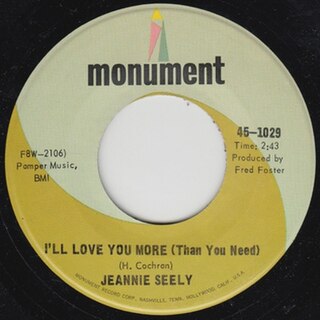
"I'll Love You More (Than You'll Need)" is a song written by Hank Cochran that was originally recorded by American country singer Jeannie Seely. Released in 1968 as a single by Monument Records, it became her third top ten single on the US country chart songs chart. The song also served as the title track to Seely's 1968 studio album I'll Love You More and received a positive response from critics following its release.

The Seely Style is a studio album released by American country artist Jeannie Seely. It was released in September 1966, by Monument Records and was produced by Fred Foster. It was Seely's debut studio album and spawned two singles that became charting songs. Its lead single, "Don't Touch Me", reached multiple record charts. The album itself reached the top ten of the US country chart and was her highest-peaking album in her career. The Seely Style received positive reviews from music publications following its release.
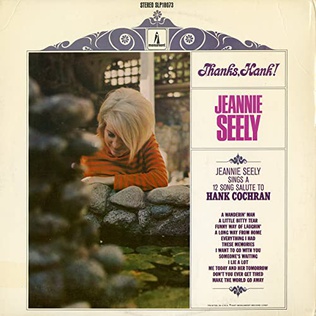
Thanks, Hank! is a studio album by American country artist Jeannie Seely. It was released on May 8, 1967, by Monument Records and was produced by Fred Foster. The record was Seely's second studio album issued and contained two singles, including the major hit "A Wanderin' Man". The album contained songs written entirely by Hank Cochran, a country songwriter, who was also Seely's husband at the time.
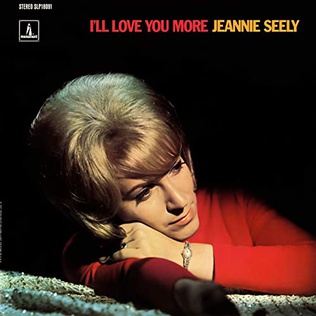
I'll Love You More is a studio album by American country artist Jeannie Seely. Her third studio record, it was released on January 15, 1968, by Monument Records and was produced by Fred Foster. The album included two singles, one of which became a hit. That song, "I'll Love You More " was a top ten hit in early 1968, leading to the release of the album.
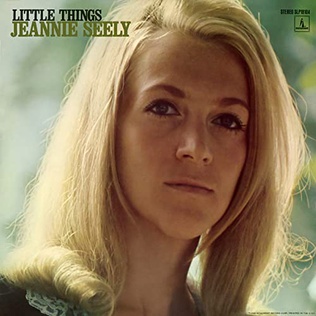
Little Things is a studio album by American country artist Jeannie Seely. It was released on December 16, 1968, by Monument Records and was co-produced by Fred Foster and Jim Malloy. The record was Seely's fourth studio album recorded and released. It spawned three singles in 1968. Two of these singles became hits on the Billboard country chart. The album would be Seely's final studio release while recording for Monument.
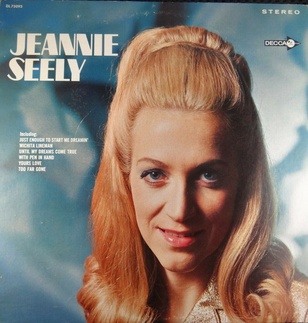
Jeannie Seely is a studio album by American country artist Jeannie Seely. Her fifth studio release, the album was released on April 7, 1969, by Decca Records and was produced by Owen Bradley. The record was Seely's first with the Decca label after recording for several years with Monument Records. Although the album was released on a major label, it did not chart on any Billboard publications upon its release.
"Wish I Didn't Have to Miss You" is a song written by Hank Cochran and Dave Kirby. It was originally and released as a duet by American country music artists Jack Greene and Jeannie Seely. Released in October 1969, the song became a major hit on the country charts in early 1970.
"What in the World Has Gone Wrong with Our Love" is a song written by Hank Cochran and Johnny Slate. It was originally and released as a duet by American country music artists Jack Greene and Jeannie Seely in July 1972.

Can I Sleep in Your Arms/Lucky Ladies is a studio album by American country music artist Jeannie Seely. It was released on November 19, 1973, by MCA Records and was produced by Walter Haynes. It was Seely's first solo studio album in three years and was her first to be issue with the MCA label. The album produced a total of six singles that were originally released between 1970 and 1973. The record is named for its two major hits: "Can I Sleep in Your Arms" and "Lucky Ladies". It would be Seely's final album for the MCA label.

Greatest Hits on Monument is a compilation album by American country music artist Jeannie Seely. It was released on March 9, 1993, via Sony Music Entertainment. The album was comprised on Seely's original recordings for the Monument label during the 1960s. It included some of her biggest hit singles during her career. It also featured songs written Seely herself as well as other writers, predominantly the material of Hank Cochran.
"When It's Over" is a song written by Hank Cochran that was originally recorded by American country artist Jeannie Seely. Released as a single by Monument Records, it reached the top 40 of the US country songs chart in 1967. It was given a positive review from Cash Box magazine following its release and was included on her studio album I'll Love You More.
"How Is He?" is a song written by Marijohn Wilkin that was originally recorded by American country artist Jeannie Seely. Released as a single by Monument Records, it reached the top 40 of the US country songs chart in 1968. It was given a positive review from music magazines following its release and was included on her studio album Little Things.
"I Miss You" is a song written by Hank Cochran and Cliff Cochran that was recorded by American country artist Jeannie Seely. Released as a single, it reached the top 40 of the US country songs chart in 1974. It was among her final top 40 country chart entries and received reviews from both Billboard and Record World magazines.
References
- 1 2 3 "Cash Box Country Reviews: Picks of the Week" (PDF). Cash Box . February 10, 1968. p. 62. Retrieved 24 July 2024.
- ↑ Erlewine, Stephen Thomas. "Jeannie Seely Biography". AllMusic . Retrieved 24 July 2024.
- 1 2 Whitburn, Joel (2004). The Billboard Book Of Top 40 Country Hits: 1944-2006, Second edition. Record Research.
- 1 2 3 Seely, Jeannie (February 1968). ""Welcome Home to Nothing"/"Maybe I Should Leave" (7" vinyl single)". Monument Records . 45-1054.
- ↑ "Monument Hits Best Quarter in History" (PDF). Cash Box . May 18, 1968. p. 28. Retrieved 24 July 2024.
- ↑ Seely, Jeannie (December 1968). " Little Things (Liner Notes)". Monument Records . SLP-18104.
- ↑ "Jeannie Seely Chart History (Hot Country Songs)". Billboard. Retrieved July 24, 2024.